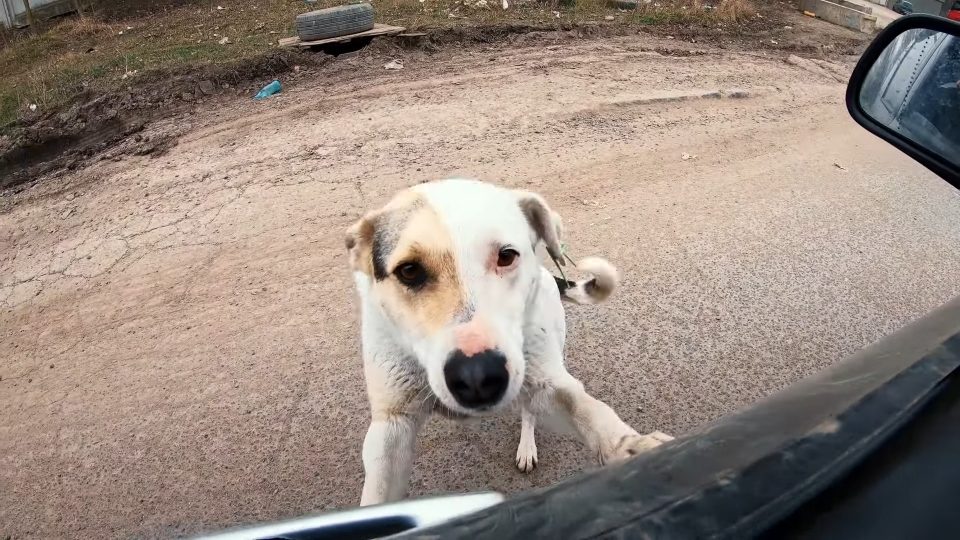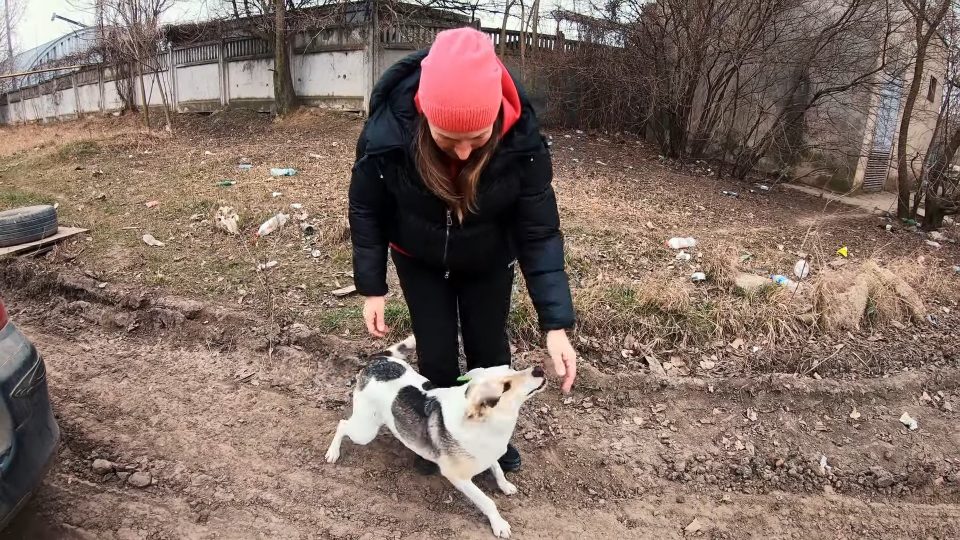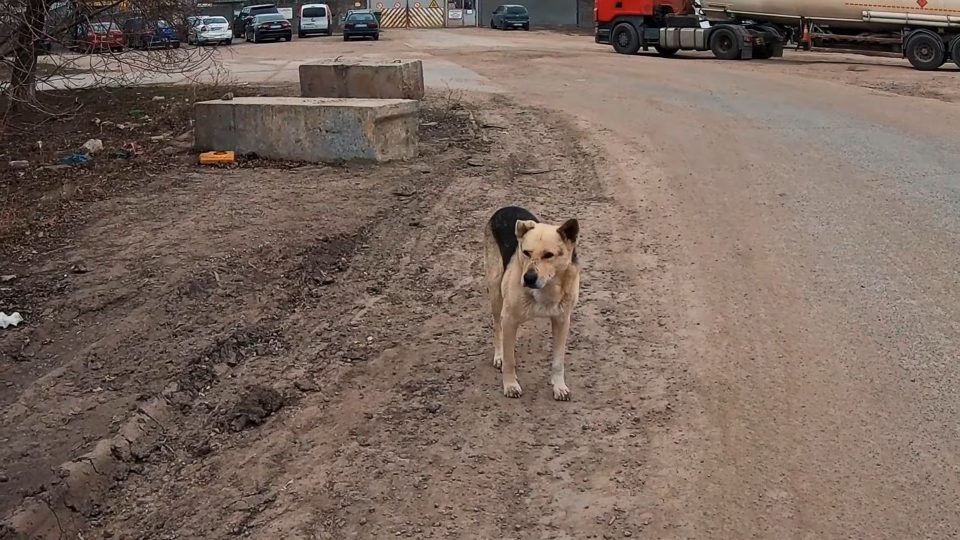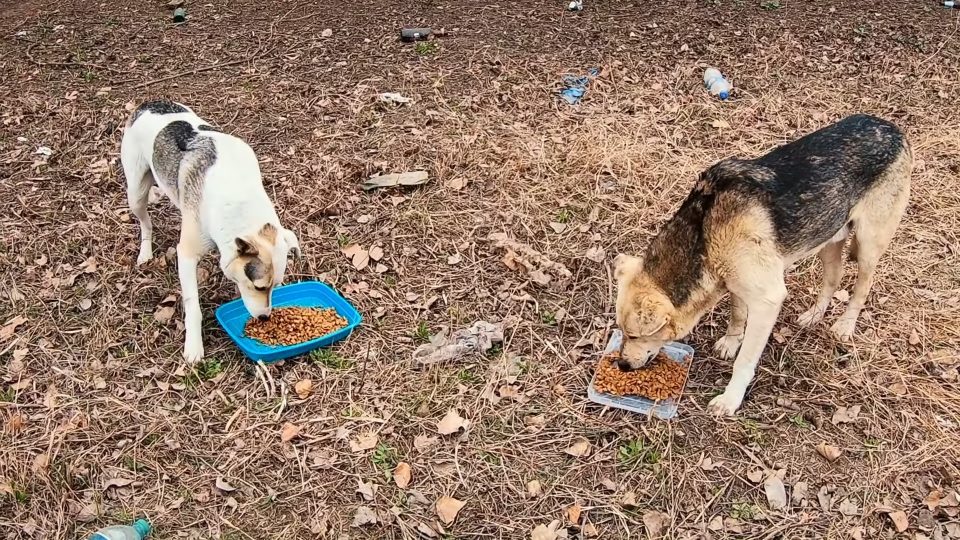For stray dogs, each day is a struggle for survival on the unforgiving streets. Each dog brings its different heartbreaking story; some were abandoned by their owners, while others have called the street their home all their lives.
Without a warm home or a loving owner, these poor creatures have to search tirelessly for some food scraps, often going to sleep with empty stomachs.
It’s a daily struggle for all of them.
Sometimes, they come across a compassionate soul who offers a moment of consolation, but more often than not, they are met with indifference and cruelty.
Some dogs, like the one from this story, are forced to face the danger of upcoming cars just to ask for a little bit of food.
Halting Cars For Help

Love Furry Friends is a small rescue that takes care of unwanted and stray animals. Its founder, Olena, is someone who has always had an immense love for all animals, especially our furry friends.
Her goal has always been to create a safe space for all rescued animals and find them a forever home; however, she can’t do it alone.
The area where she lives has more than 20,000 stray dogs, with the situation getting worse each year.
All shelters are overcrowded, and they can’t take any more new dogs, so a lot of stray animals sadly have to stay on the streets, even during very cold winters and hot summers.
It’s simply heartbreaking to think that so many innocent animals have to fight to survive each passing day.

Even though she is physically not able to take in all the dogs, Olena tries to help them as much as she can. She brings them food and water, treats, administers vaccinations, and ensures that they are spayed and neutered.
It’s the least she can do to help these poor animals. “I want to set an example to others to care for animals and to not be afraid to open your arms for help and love,” she writes on her YouTube channel.
Feeding The Hungry Stomachs

When this adorable dog saw someone approaching, he didn’t hesitate to run toward the car to ask for help.
Olena immediately stopped her car to bring out the food, but then she noticed another dog hesitantly approaching.
He wasn’t as friendly as the first dog, but his eyes were filled with sadness, silently pleading for help.
After giving some love to the first dog, she poured some kibble for the two dogs, which they immediately started devouring.

They lived in an abandoned area with not much going on around, so without Olena bringing them food, they would go days without eating anything.
After the food, she gave them water as well to hydrate. The black and brown dog remained wary, quickly moving away from her, but he did enjoy the gifts she brought.
It’s not the perfect solution, but at least they don’t go to sleep with an empty stomach.
“Love has no boundaries! Thanks so much for your unreserved love and compassion for giving food to these and other innocent lovely stray furry friends,” one person commented on YouTube, expressing gratitude for everything she does.
If only there were more people like this, the world would certainly be a better place.
If you’ve ever noticed your furry friend constantly gnawing at their paws, you’re not alone. It’s a common behavior that can leave you wondering what’s going on in your pup’s head. Dogs chewing their paws can be a perplexing sight, but there are a few reasons why they might be doing it. Understanding the underlying causes behind this behavior can help you provide the best care for your canine companion.
As a seasoned dog trainer, I’ve seen this behavior in many dogs, and it’s essential to address it early on to prevent any potential issues. While occasional paw chewing is normal, excessive or persistent paw chewing could signal an underlying problem that needs attention. So, let’s unravel the mystery behind why your dog might be chewing their paws and how you can help them find relief.
Understanding the Behavior: Why Does My Dog Chew His Paws
Common Reasons for Paw Chewing
When your furry friend chews their paws, it may be due to common reasons such as allergies, skin irritations, or boredom. Allergies from food, grass, or other environmental factors can trigger this behavior. Additionally, skin issues like dry skin or irritations can lead your dog to chew on their paws for relief. Boredom or anxiety can also manifest as excessive paw chewing.
When Paw Chewing Is a Cause for Concern
While occasional paw chewing is normal, persistent paw chewing or noticeable redness, swelling, or sores on the paws can be a cause for concern. These symptoms could indicate more serious issues like skin infections, injuries, or underlying health conditions that require veterinary attention. Monitoring your dog’s paw chewing behavior and seeking professional advice if you notice concerning signs is essential for their well-being.
Signs to Monitor During Paw Chewing
Physical Indicators to Watch Out For
When your furry friend engages in paw chewing, keep an eye out for physical signs that may indicate an underlying issue. Look for redness, swelling, or sores on the paws. These symptoms can suggest allergies, infections, or injuries that require professional assessment. Additionally, inspect the fur between their toes for any signs of irritation or discharge. Monitoring these physical indicators can help identify potential health concerns early on.
Behavioral Signs That Suggest Discomfort
In addition to physical symptoms, pay attention to your dog’s behavior while they chew their paws. Signs of discomfort like whimpering, licking excessively at their paws, or favoring one leg over the other could indicate pain or discomfort. Moreover, observe if they become more irritable or anxious during these episodes. Behavioral changes during paw chewing can provide insights into your furry companion’s well-being and help you determine if a visit to the vet is necessary.
Potential Health Issues Associated with Paw Chewing
If your dog is constantly chewing on their paws, it could be a sign of underlying health issues. Here are some potential health issues to be aware of when it comes to paw chewing:
Allergies and Skin Conditions
Allergies and skin conditions are common reasons dogs chew their paws. Dogs can be allergic to various things like food, pollen, or grass, leading to itchy paws. Skin conditions such as dermatitis can also cause discomfort, making a dog chew on their paws to relieve the irritation.
Parasites and Infections
Parasites like fleas or ticks can cause itching and discomfort, prompting a dog to chew on their paws. Additionally, fungal or bacterial infections can lead to paw chewing. If left untreated, these issues can worsen and affect your dog’s overall health.
Pain and Injuries
Pain or injuries in the paws or joints can also result in excessive chewing. Your dog may be trying to alleviate the pain by gnawing on their paws. Injuries from rough play, walking on rough surfaces, or even foreign objects stuck in the paw can cause this behavior.
Keeping an eye on your dog’s paw chewing habits and being vigilant for signs of discomfort is crucial. If you notice any of these issues or if the paw chewing persists, it’s best to consult your veterinarian. Early detection and treatment can help ensure the well-being of your furry companion.
Addressing the Issue: How to Help Your Dog
Veterinary Solutions for Paw Problems
If your dog is persistently chewing their paws and showing signs of discomfort, the first step is to consult a veterinarian. A professional can diagnose any underlying health issues such as allergies, infections, or skin conditions that may be causing the behavior. They can recommend appropriate treatment options, which may include medications, specialized diets, or topical solutions to alleviate your dog’s paw problems.
Home Remedies and Preventative Measures
In addition to veterinary care, there are some home remedies and preventative measures you can take to help your dog with paw chewing. Regularly inspect your dog’s paws for any signs of redness, swelling, or sores, and keep them clean and dry. Ensure your dog is on a balanced and nutritious diet to support overall skin health. Some dogs benefit from wearing protective boots to prevent excessive chewing. Providing appropriate chew toys can also help redirect their chewing behavior away from their paws.
Behavioral Modification and Training
Addressing paw chewing behavior through training and behavioral modification is crucial for long-term success. Positive reinforcement techniques can be used to train your dog to stop chewing their paws and redirect their focus onto more appropriate activities. Engaging your dog in regular physical exercise and mental stimulation can help alleviate boredom, reducing the likelihood of paw chewing out of habit. Consistency and patience are key when implementing training methods to effectively address and modify your dog’s behavior.
Products That Can Aid in Preventing Paw Chewing
Protective Dog Footwear
Consider using protective dog footwear like booties or socks to shield your dog’s paws from irritants or allergens that may trigger chewing. These items can create a barrier between your dog’s paws and the environment, reducing the chances of paw irritation leading to excessive chewing.
Bitter Sprays and Topical Applications
Bitter sprays and topical applications can deter your dog from chewing on their paws by providing a bitter taste that dogs generally dislike. Applying these products to your dog’s paws can help discourage the behavior and prevent potential skin issues caused by excessive chewing.
Chew Toys and Distraction Techniques
Offering your dog suitable chew toys can redirect their focus from chewing on their paws to more appropriate items. Interactive toys, puzzle feeders, or durable chew toys can engage your dog’s mind and alleviate boredom, reducing the likelihood of paw chewing. Engaging your dog in physical activities and games can also serve as effective distraction techniques to deter paw chewing behavior.
Remember, while these products can aid in preventing paw chewing, it’s crucial to address the root cause of the behavior by consulting a veterinarian for a proper diagnosis and treatment plan tailored to your furry companion’s specific needs.
Conclusion
Now that you’ve learned about the various reasons why your dog might be chewing their paws, it’s essential to take action. Keep an eye out for any signs of allergies, skin issues, or boredom that could be causing this behavior. Remember, seeking veterinary advice is crucial if the paw chewing persists. By incorporating regular paw checks, a well-balanced diet, and engaging your pup with chew toys, you can help address this habit. Don’t forget the power of positive reinforcement and mental stimulation through training to redirect their focus. Consider using protective boots, bitter sprays, or distraction techniques to deter paw chewing. Ultimately, understanding the root cause and working with your vet on a personalized plan is key to ensuring your furry friend’s paws stay healthy and happy.
Frequently Asked Questions
Why do dogs chew their paws?
Dogs may chew their paws due to allergies, skin irritations, boredom, or health issues. Monitoring for signs of discomfort and consulting a vet is crucial.
What health issues are associated with paw chewing?
Paw chewing can indicate allergies, skin conditions, parasites, infections, pain, or injuries. Persistent chewing warrants veterinary attention for proper diagnosis and treatment.
How can I address my dog’s paw chewing behavior?
Consult a vet for diagnosis and consider home remedies like regular paw inspections, a balanced diet, protective boots, and appropriate chew toys. Behavioral modification through training and mental stimulation is essential.
What products can help prevent paw chewing?
Protective dog footwear, bitter sprays, and chew toys can deter paw chewing. Redirecting a dog’s focus with distraction techniques is also effective. Seek vet advice for a tailored treatment plan.
[no_toc]

Hey there, I’m Janet Brooks, a dog-loving student from California. I’m all about helping pups in need, especially those without homes. Me and my awesome friends work together to give shelter and love to stray dogs. Oh, and I also write blogs about dogs to share helpful info.